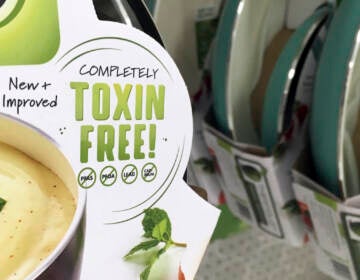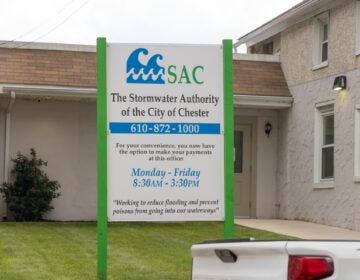Philly sues 3M, DuPont, and other companies over ‘forever’ chemical contamination
Philadelphia is the latest in a national trend of lawsuits accusing chemical companies of contaminating water supplies with long-lasting toxic chemicals.

DuPont and 3M are among the companies being sued by the City of Philadelphia. (AP Photo/Richard Drew, File; AP Photo/Jim Mone)
The City of Philadelphia has sued DuPont, 3M, and other chemical companies for contaminating drinking water with the toxic class of chemicals PFAS.
The civil suit was filed by the City’s Law Department in the Court of Common Pleas of Philadelphia County on Friday.
Numerous other states and cities have taken similar legal action over the years, because of the numerous health effects linked to PFAS, which stand for “per-and polyfluoroalkyl substances.”
The Centers for Disease Control and Prevention says those exposed have a higher risk for high cholesterol, kidney cancer, testicular cancer, and damage to the immune system.
“You can’t make a mess and expect others to clean it up,” said Mayor Jim Kenney in a statement.
“The defendants in this case knew their products were dangerous, but selfishly brought them to market anyway in pursuit of profits. This lawsuit will make them pay the costs the City will now need to incur to treat and remove PFAS to proactively protect Philadelphians and the environment.”
For decades, PFAS chemicals have tainted the water, air, and soil in this region and across the country. These so-called “forever” chemicals are widely used in consumer products such as nonstick cookware, flame-retardant fabrics, and some food packaging, as well as in firefighting foam used at current and decommissioned military bases.
The consequences of exposure are long-lasting — the compounds can stay in the human bloodstream for years.
The lawsuit is a pathway toward accountability, said Tracy Carluccio of Delaware Riverkeeper Network, which has been advocating for PFAS regulations.
“Those who are responsible for the PFAS pollution have to be the ones to pay for cleaning it up and making amends for the damage that has been done,” she said.
Philadelphia Water Commissioner Randy E. Hayman said the Philadelphia Water Department began testing for PFAS in 2019, and no drinking water samples have exceeded the new proposed state limits for PFOA or PFOS, the two most commonly studied types of PFAS.
“This is part of a proactive effort to ensure that PFAS levels in our water remain below all state and federal regulations in the coming years,” he said in a statement. “We support this action to hold those responsible for the pollution accountable in court, and we will continue to inform the public about what we are learning and how we are addressing this issue to ensure the safety of our drinking water.”
However, some of the department’s drinking water treatment plants tested for PFOS and PFAS above the Environmental Protection Agency’s new non-enforceable health advisory of nearly zero parts per trillion.
The lawsuit alleges the chemical companies were negligent in the creation of PFAS and failed to warn the public about the dangers of the compounds. The lawsuit lays out a widespread coverup, alleging that the defendants were members of a group known as the Fire Fighting Foam Coalition, which was established to defend products that contained PFAS. The complaint alleges the FFFC asserted that “telomer based fire fighting foams are not likely to be a source of PFOA in the environment.”
In addition to drinking water supplies, the lawsuit says Philadelphia International Airport and Northeast Philadelphia Airport are contaminated with PFAS because of the use of fire suppressant foam.
“Despite their knowledge that PFAS Products posed grave environmental and human health risks, and despite the availability of safer alternative products, Defendants failed to warn customers, users, the public, and the City about those risks, and they failed to take any other appropriate precautionary measures to prevent or mitigate PFAS contamination of the environment,” the complaint reads. “Instead, Defendants falsely and misleadingly promoted PFAS Products as being environmentally sound and appropriate for widespread use.”
Carluccio calls the lawsuit’s claims “damning.”
“It’s still always shocking to read that they knew and they covered it up, very similarly to the tobacco companies and smoking,” she said. “The evidence they put in there … shows not just negligence or sloppiness in how they conducted their business, but willful disregard, and continuing to manufacture with it and cover up the health effects that they knew from the evidence that they had gathered.”
The lawsuit seeks compensatory and punitive damages, loss-of-use and natural resource damages, and an abatement fund.
The city did not specify how they would spend the funds if they won the lawsuit, but plaintiffs in similar suits have stated they plan to spend it on purifying drinking water, PFAS testing, research and development, and community health clinics.

Get daily updates from WHYY News!
WHYY is your source for fact-based, in-depth journalism and information. As a nonprofit organization, we rely on financial support from readers like you. Please give today.







